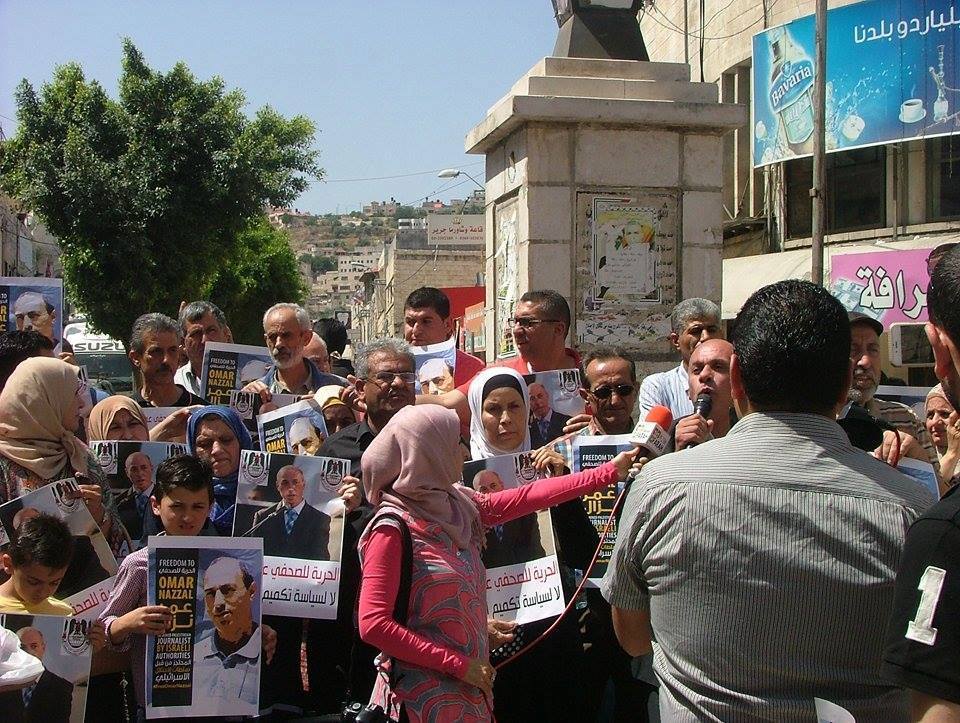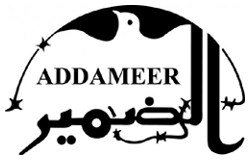
As the world marks World Press Freedom Day on 3 May, Palestinian journalist Omar Nazzal, member of the General Secretariat of the Palestinian Journalists’ Syndicate and president of the Association of Democratic Journalists, was ordered to four months in Israeli administrative detention – imprisonment without charge or trial on the basis of “secret evidence.”
Nazzal’s order to administrative detention came alongside the imprisonment of journalist, human rights defender and media and communications officer of Addameer Prisoner Support and Human Rights Association, Hassan Safadi, in a dawn raid on Monday, 2 May.
The Israeli military made vague accusations that Nazzal is linked to the Palestinian leftist political party and resistance organization, the Popular Front for the Liberation of Palestine. “His lawyer, Mahmoud Hassan, said he believes his client, a leading member of the Palestinian journalists’ union, is being targeted because of his political activism. Hassan noted that under the system of administrative detention, the defence is not shown any alleged evidence against them,” reported the Guardian following the order against Nazzal on Monday, 2 May in Ofer Military Court. All major Palestinian political parties are labeled “prohibited organizations” by the Israeli occupation.
Palestinian journalists have protested repeatedly in Ramallah, Jenin and elsewhere, demanding Nazzal’s freedom and an end to the attacks on Palestinian journalists. “The military occupation’s decision as a dangerous precedent against the Palestinian Journalists Syndicate and sends a very clear message of targeting the leadership of the union and all journalists,” said Nasser Abu Baker, president of the Palestinian Journalists Syndicate following the administrative detention order.
The EFJ General Meeting released a declaration, noting that the meeting “condemns in the strongest terms the arrest of Palestinian journalist board member, Omar Nazzal, as he was crossing from the West Bank into Jordan to attend this meeting and his subsequent incarceration at Etzion prison near Bethlehem. GM demands that Omar Nazzal is released forthwith.”
Nazzal was arrested on 23 April 2016 as he attempted to cross the al-Karameh crossing to Jordan in order to participate in the General Meeting of the European Federation of Journalists, part of the delegation of the Palestinian Journalists’ Syndicate.
Administrative detention orders are indefinitely renewable following their initial imposition; not only is Nazzal imprisoned without charge or trial, he has no way to know when his detention will end in reality. He joins 19 imprisoned Palestinian journalists and 750 Palestinians held in administrative detention without charge or trial. Among those held in administrative detention include civil society leader Eteraf Rimawi, circus teacher and performer Mohammed Abu Sakha, and members of the Palestinian Legislative Council, including Hatem Kufaisheh, whose detention was extended in a new military order for three-months administrative detention on 2 April. Kufaisheh was originally arrested on 24 January and ordered to administrative detention; in total, he has spent 13 years in Israeli prison and 150 months in administrative detention.
Samidoun Palestinian Prisoner Solidarity Network demands the immediate release of Omar Nazzal, Hasan Safadi, and all Palestinian journalists imprisoned by the Israeli occupation. We also demand the immediate release of all Palestinian administrative detainees, an end to the practice of administrative detention and the freedom of all 7,000 Palestinian prisoners.
We urge international media organizations, media workers’ associations, and journalists’ unions to take up the call to defend Palestinian journalists under attack, including organizing to free Omar Nazzal and his fellow imprisoned journalists. All international organizations and governments who today mark World Press Freedom Day have an obligation to defend the freedom of the press for occupied Palestinians and pressure Israel to release imprisoned Palestinian journalists, and end the closures of Palestinian media outlets and mass arrests of Palestinians for posts on social media.
This includes the implementation of boycott, divestment and sanctions against Israel – including ending special economic agreements like the EU/Israel Association Agreement and an end to billions of dollars in US military aid – because of its ongoing violations of Palestinian rights, including the rights of Palestinians to freedom of the press and freedom of association.




